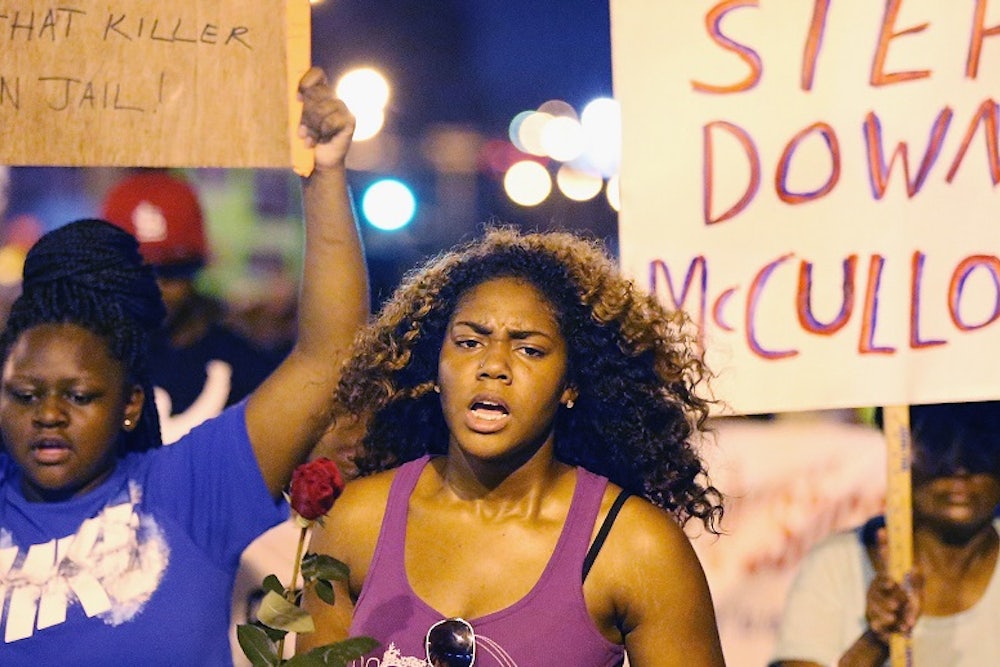After Officer Darren Wilson shot and killed Michael Brown in Ferguson, Missouri on August 9, protests erupted in the streets, as residents demanded that Wilson face criminal charges. Over the past three months, that process has been underway as a grand jury has been hearing evidence on the case and deciding whether to indict Wilson. It is expected to reach a decision any day now.
No one knows whether Wilson will be indicted. But if the grand jury decides that there is not enough evidence to indict, there will be new protests, potentially violent ones. Missouri officials are trying to prevent that from happening. On Tuesday, Governor Jay Nixon explained that no violence would be allowed and that, if necessary, he would call in the National Guard to keep the peace. "This is America. People have the right to express views and grievances, but they do not have the right to put fellow citizens and property at risk," he said. "Violence will not be tolerated."
Ferguson residents are preparing for the worst. At Salon, Joanna Rothkopf reports that gun sales at a nearby shooting range were up 40-50 percent last week and one Ferguson insurance broker told CNN that he brings an extra gun to work in case he is trapped and has "to have a John Wayne shootout." Ferguson cops are readying themselves as well, purchasing thousands of dollars worth of riot gear, pepper spray and rubber bullets.
Why does everyone—Governor Nixon, Ferguson residents and cops—seem prepared for further protests if the grand jury's decision is unknown? That's because a Washington Post investigation and the release of an autopsy report from the county medical examiner's office all point towards Wilson not being indicted. The Post, for instance, reported that “seven or eight African American eyewitnesses have provided testimony consistent with Wilson’s account, but none of them have spoken publicly out of fear for their safety.” This isn’t all the evidence, of course, and the grand jury could still indict Wilson. But the leaks in the case have Missouri officials and Ferguson residents preparing for no criminal charges.
From what we know, the evidence in the case is very murky. Eyewitness accounts vary and the autopsies don't offer definitive proof about what happened that August day. We may never know. If Wilson isn't indicted, many people may look at this evidence and believe that the grand jury made the correct decision. But for many Ferguson residents, the evidence—and the criminal justice system as a whole—has lost all credibility. The system has been too racist, for far too long, for them to believe that it would handle the Michael Brown case fairly. They have no faith that Robert McCulloch, the lead prosecutor, will impartially present the evidence, given the fact that his father, a cop, was shot and killed by an African-American. Ferguson residents became even more suspicious of the case after the leaks to the Post, which even the Department of Justice condemned, saying "There seems to be an inappropriate effort to influence public opinion about this case.”
There is, of course, never an excuse for violence and if Ferguson residents are upset at the grand jury’s decision, they should express their feelings peacefully. But it's hard not to sympathize with them if Wilson faces no charges. Why would they have confidence that the system worked, given everything that has happened? Why should any of us? In the end, all we have is the evidence to go on. But if the outcome of this case leaves you with more questions than answers—and a deep-seated anger at the system as a whole—you won't be alone.
—Danny Vinik
News from Tuesday:
CLIMATE: The U.S. and China have announced a historic deal to fight climate change by limiting both countries' emissions. For the first time, China has said its emissions will peak by 2030. Rebecca Leber explains what the deal means at QED.
TRADE: U.S. and China agreed to cut tariffs on technology products during the Asia-Pacific Economic Cooperation near Beijing. (Mark Landler, New York Times)
Articles worth reading:
Bishops in charge of health care: Catholic-sponsored hospitals in the U.S. increased 16 percent from 2001-2011, even as the number of overall hospitals has declined. Nina Martin writes how this has worrisome implications for maternity care and reproductive health. (ProPublica)
Did voter suppression determine some elections last week? Catherine Rampell says it’s too early to know for sure, but it seems likely. (Washington Post)
Taxes: Obama did not fight to extend the payroll tax cut at the end of 2012. And it may have hurt Democrats in the midterms. (Zachary Goldfarb, Wonkblog)
Long Read of the Day: Paige Williams takes us to Alabama, where a judge can override a jury, even on the death penalty. (New Yorker)
Dark humor: Daphne Merkin reflects on the four decades she’s spent in therapy—including a period where she felt the need to entertain her therapists. (New York Times)
What we’re watching:
We’ll keep our eyes on Ferguson, but for now the big news is that U.S.-China climate deal. QED will have full coverage.
At QED:
As the dust settles post-midterms, Alec MacGillis points out that the NRA was not one of the election’s winners. Danny Vinik is already looking ahead to 2016 and sees three potential candidates who may challenge Hillary Clinton for the Democratic nomination. Jonathan Cohn breaks down the numbers, state by state, to show how a Supreme Court ruling against Obamacare would affect people’s premiums—and the number of people without coverage. In a piece for the magazine, Rebecca Traister writes about abortion and about choosing between women and their fetuses.
Clips compiled by Claire Groden and Naomi Shavin.
